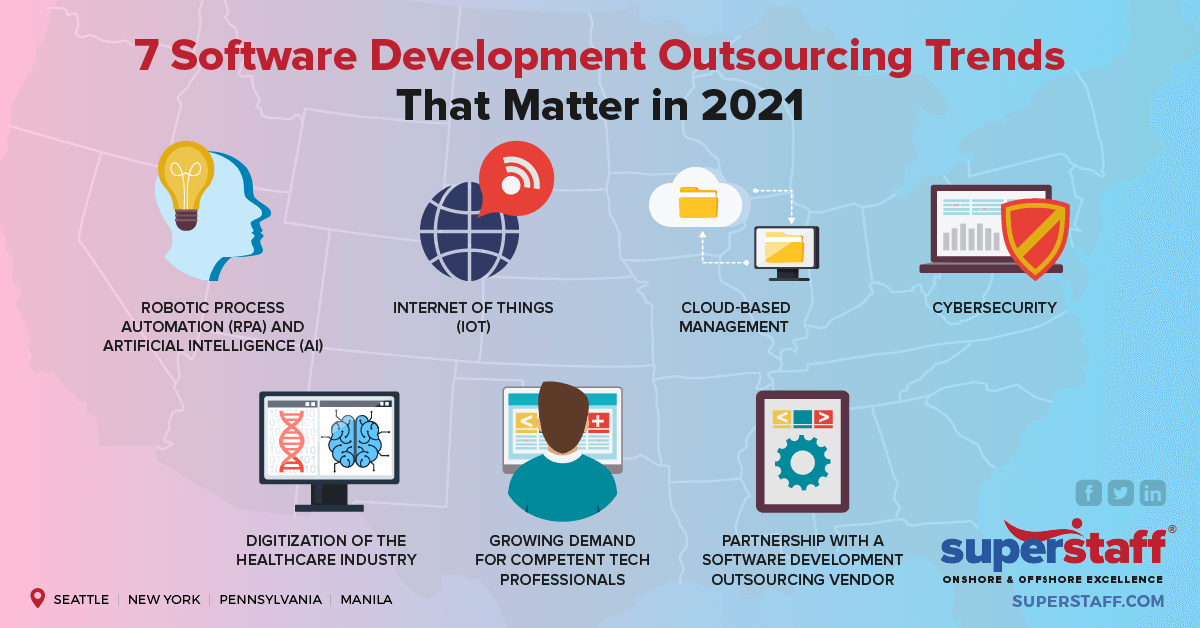
With the pandemic continuously reshaping market behavior, one cannot overemphasize the crucial role of information technology in today’s business landscape. Digitization is now front and center in keeping companies running. But with COVID-19’s impact on the global economy, many companies find it challenging to keep pace with digital transformation.
As such, many businesses are relying on software development outsourcing. According to Statista, the contract value of IT outsourcing worldwide amounted to $66.5 billion in 2020. The Grand View Research, on the other hand, forecasted the growth in IT outsourcing services to reach $940 billion in 2027.
What Is Software Development Outsourcing?
Software development outsourcing is the process of acquiring the services of a third-party contractor to develop software projects, streamline internal processes, or improve client services on the front-end. Over the past decades, the software development outsourcing sector has experienced enormous growth and the recent pandemic paved the way for the emergence of new trends.
7 Software Development Outsourcing Trends in 2021 and Beyond
If you’re considering outsourcing software development, here are some of the most significant trends to look out for:
1. The Rise of Robotic Process Automation (RPA) and Artificial Intelligence (AI) in IT Outsourcing
The high demand for work agility and enhanced customer experience propelled the growth of business process automation using RPA and AI. One research forecasted that the global market size of robotic process automation will grow at a compound annual growth rate (CAGR) of 32.8% from 2021 to 2028.
While cost-efficiency is still factored in when companies outsource RPA, it is no longer the main differentiator. Businesses are engaging the services of software development outsourcing companies to gain access to sophisticated technologies that allow them to complete repetitive and high-volume tasks efficiently.
The following statistics further highlight the value of business process automation:
- Automation can open an estimated $150-billion opportunity for operational improvement
- Knowledge work automation is expected to impact the economy by $5-7 trillion by 2025
- 25% of enterprises are optimistic that AI will help them grow despite the pandemic
2. Driving Customer Experience Through the Internet of Things (IoT)
In today’s economy, customer experience is the main driver for the success of a business. The Internet of Things has been proven to help enterprises come up with data-driven strategies to enhance customer engagement and satisfaction. From seamless data sharing to personalization and cross-communication, the role of IoT cannot be undermined.
The following forecasts reflect how the Internet of Things will continue to impact the market in the new normal:
- Global IoT expenditure to post a CAGR of 11.3% up to 2024
- IoT device usage to exceed 75 billion by 2025
- Consumer spending on smart home devices to reach $157 billion in 2023
- Connected devices to reach 1.1 billion in 2022
3. Shift to Cloud-Based Management
The COVID-19 crisis paved the way for increased reliance on cloud-based management platforms. As companies from all parts of the world shift to remote work settings, the demand for centralized data storage solutions grows. This upward trend is expected to continue even as we move to the next normal.
According to Synergy Research Group, the three major players in the cloud industry alone gained revenue of nearly $40 billion in the first quarter of 2021 (37% higher than the previous year). The worldwide public cloud computing market is expected to continue to grow and reach an estimated revenue of $362 billion in 2022.
Here are some reasons why you should join the cloud computing software development outsourcing trend:
- Minimize capital expenditures by 38%
- Reduce operational complexity by 33%
- Increase simplicity and speed by 32%
- Reduce internal IT labor cost by 20%
4. Increased Need for Cybersecurity
Digital transformation is moving at a rapid pace, and it is less likely to slow down. Now more than ever, cybersecurity should be given prime importance. In 2020, the United Nations reported a 600% increase in cybercrime during the pandemic. According to the same report, cyberattacks happen every 39 seconds.
Despite the surge in cyberattacks, many companies lack the resources to respond. In a survey conducted among 500 U.S. IT decision-makers in 2020, 79% said they had to reduce their teams’ headcounts because of the impact of the pandemic.
As a result, more companies are turning to cybersecurity outsourcing in 2021. In the same survey, it was found that:
- 83% of IT leaders plan to outsource cybersecurity in 2021
- 56% intend to allocate more than 40% of their IT budgets to cybersecurity
- 37% listed “improving cybersecurity protections” as their main IT investment
5. Further Digitization of the Healthcare Industry
Even before the pandemic, the healthcare sector has already been steadily adapting to digital technology. However, the outbreak forced the industry to switch to digital solutions and embrace software development outsourcing solutions with urgency.
The Center for Disease Control and Prevention reported a 154% increase in telehealth visits in the first quarter of 2020, compared to the same period in 2019. The digitization of some aspects of healthcare has been beneficial in decreasing the risk of contagious diseases, preserving personal protective equipment supplies, and reducing the demand for onsite facilities.
Here are other trends that will continue to shape the healthcare industry in the coming years:
- Telehealth will continue and is expected to reach a revenue of $185.6 billion by 2026
- AI in healthcare is expected to grow to up to $67 billion by 2027
- The healthcare monitoring apps market is expected to rise to $27 million by 2023
- The global patient monitoring market is expected to reach more than $42 million by 2027
- The global market size of the healthcare Internet of Things is projected to reach up to $188.2 billion by 2025
6. Growing Demand for Competent Tech Professionals
As technology progressed rapidly, the demand for tech specialists grew exponentially. The increased reliance on emerging technology has led to a cutthroat hunt for IT experts with the most upgraded skill sets.
In an analysis conducted by CompTIA about the U.S. tech sector employment, it was found that in January 2021:
- The U.S. technology sector added 19,500 jobs
- IT-related occupations grew by 78,000
- Job postings for core IT positions reached more than 232,000
- Job postings for positions in emerging technologies reached nearly 65,900
Some of the most in-demand tech positions are as follows:
- Software and application developers (67,200 job openings)
- IT support specialists (21,000 job openings)
- Systems engineers and architects (18,200 job openings)
- IT project managers (16,000 job openings)
- Systems analysts (15,200 job openings)
- Artificial intelligence-related occupations (9,715 job openings)
With the competition growing tougher every day, IT businesses are under pressure to achieve digital excellence to remain competitive. This makes outsourcing software development even more essential. Partnering with a reliable software development outsourcing company, with access to qualified talents from different parts of the world, can help businesses fill the skill gap faster.
7. Forging Strategic Partnership With a Single Software Development Outsourcing Vendor
The pandemic showed us how risks can turn into reality overnight. As such, many businesses are seeking better ways to remain resilient amid uncertainties. Many are realizing the risk-mitigation benefits that an experienced software outsourcing company can offer.
Nowadays, software outsourcing companies are no longer considered “staffing agencies.” Many providers have turned into full-on strategic business partners, providing end-to-end solutions to businesses. Even core business functions are being outsourced these days.
Additionally, clients are also seeing the importance of outsourcing multiple aspects of software development to a single vendor. With the fast-growing tech environment, having a single point of contact proves to be not just cost-effective but more productive as well.
Experience the Benefits of Software Development Outsourcing From SuperStaff
Achieving digital excellence requires the expertise of high-caliber professionals in the field of software and application development. Boost your success in this area by building a collaborative partnership with a reputable software development outsourcing vendor.
At SuperStaff, we can help future-proof your business and give you the competitive edge you need to thrive in this age of digital transformation. We have more than a decade of experience in delivering quality outsourcing solutions in the field of software and application development.
Book a consultation with us today and let’s get your business ready for the digital future.






